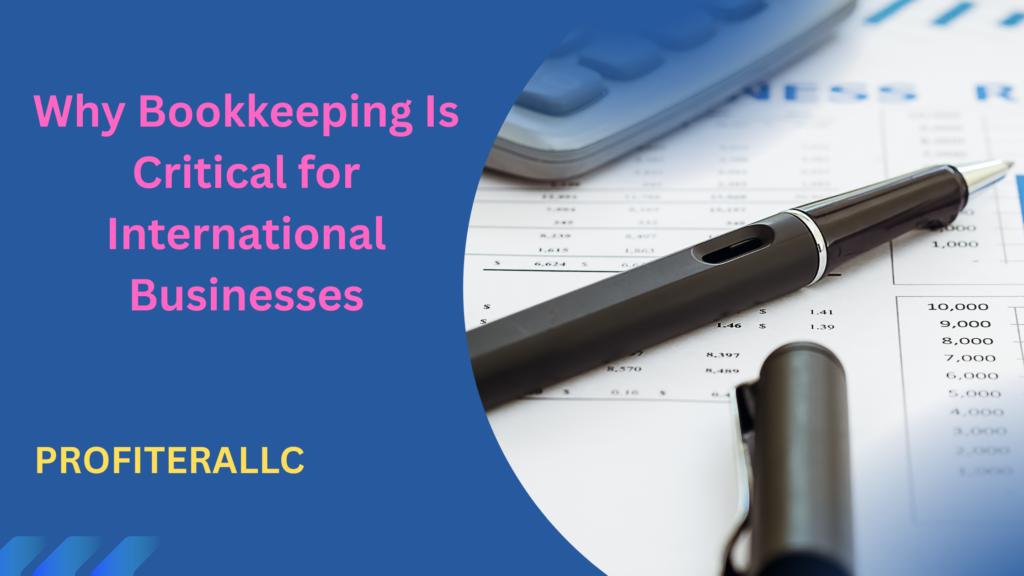
Introduction
In today’s global economy, businesses are increasingly operating across borders. From e-commerce startups selling globally to multinational corporations with offices in multiple countries, international business is booming. But with this opportunity comes complexity—especially when it comes to financial management. That’s where bookkeeping becomes not just important, but absolutely essential.
In this blog post, we’ll explore why bookkeeping is critical for international businesses, how it differs from domestic bookkeeping, and the long-term advantages it offers in terms of compliance, transparency, decision-making, and growth.
What Is Bookkeeping in an International Context?
Bookkeeping involves recording and managing financial transactions in a systematic way. In an international business setting, bookkeeping becomes more complex due to:
- Multiple currencies
- Cross-border transactions
- Varied tax regulations
- International reporting standards
- Language and cultural barriers
This makes bookkeeping a foundational pillar of a well-run international business.
1. Ensures Global Compliance with Laws and Tax Regulations
🌍 Navigating Different Tax Laws
Every country has its own tax system, VAT rules, and reporting requirements. International businesses need to comply with all of them simultaneously. Poor bookkeeping can lead to:
- Incorrect tax filings
- Penalties and interest charges
- Legal complications
✅ Bookkeeping Helps You:
- Track taxable revenue by country
- Maintain accurate documentation for audits
- Calculate VAT/GST across different jurisdictions
- Ensure regulatory compliance in each market
2. Provides Financial Clarity Across Borders
International businesses deal with multiple currencies, exchange rates, and overseas bank accounts. Without proper bookkeeping, managing this financial diversity becomes chaotic.
🧾 Why This Matters:
- Currency fluctuations affect profit margins
- Payment delays from overseas clients can disrupt cash flow
- Complex logistics and operations require real-time data
📈 Benefits of Organized Bookkeeping:
- Clear visibility of income and expenses by region
- Accurate currency conversions and reconciliations
- Transparent multi-entity accounting
3. Facilitates Strategic Decision-Making
Accurate books empower business leaders to make informed decisions. In international settings, this is even more vital due to higher risk and operational scale.
Examples:
- Decide which markets are most profitable
- Allocate resources efficiently
- Optimize supply chain expenses
- Negotiate with international vendors
Bookkeeping turns your financial data into a strategic asset.
4. Boosts Investor and Stakeholder Confidence
Whether you’re working with global investors, banks, or partners, they all expect transparency. Solid bookkeeping builds credibility.
📊 How Good Bookkeeping Helps:
- Professional financial reports (P&L, balance sheet, cash flow)
- Demonstrates accountability
- Eases fundraising, especially from international VCs
- Enhances brand reputation
5. Enables Seamless Cross-Border Operations
From paying international suppliers to managing payroll in different countries, bookkeeping streamlines operational complexity.
Key Operational Functions Supported:
- Vendor payments in multiple currencies
- Tracking international shipping and logistics costs
- Payroll processing in accordance with local labor laws
- Centralizing financial data from multiple branches
6. Prepares Businesses for Audits and Financial Reviews
International businesses are often subject to both internal and external audits—across jurisdictions. Poor recordkeeping can turn audits into nightmares.
📋 Bookkeeping Supports:
- Easy retrieval of transaction records
- Accurate audit trails
- Internal control systems
- Better risk management
7. Improves Cash Flow Management
Global businesses often face cash flow issues due to delayed payments, high operational costs, and fluctuating exchange rates.
With proper bookkeeping:
- You can forecast cash flow needs by region
- Ensure timely invoicing and payment tracking
- Avoid currency exchange loss surprises
Good bookkeeping helps you stay liquid, not just profitable.
8. Integrates with Accounting and ERP Systems
Modern bookkeeping is not done in isolation. It integrates with accounting, ERP, CRM, and inventory management platforms—especially important for businesses with international supply chains and sales teams.
Benefits:
- Automated currency conversions
- Region-wise financial dashboards
- Seamless reporting for global teams
- Simplified tax reporting
9. Helps in Business Valuation and Exit Strategy
If you plan to sell, merge, or seek funding, clean books are a must. International buyers or partners will conduct strict due diligence.
Bookkeeping allows you to:
- Showcase historical performance
- Prove compliance
- Justify your valuation with data
- Reduce red flags during acquisition
10. Supports Scalability and Sustainable Growth
If your goal is to expand globally, your bookkeeping must scale with you. Businesses with strong financial systems grow faster and more sustainably.
Scalable Bookkeeping Means:
- Adding new currencies and regions without chaos
- Scaling teams with regional payroll compliance
- Automating workflows and reconciliations
- Gaining insights for future markets
Best Practices for International Bookkeeping
- Use Cloud-Based Accounting Tools
E.g., QuickBooks Online, Xero, Zoho Books - Automate Currency Conversions
Use tools that auto-fetch real-time rates - Work with International Bookkeeping Experts
Outsourcing to specialists who understand global rules - Keep Documentation in Multiple Languages (if needed)
Especially for foreign audits or tax filings - Review Books Monthly or Quarterly
Ensure regular audits and reporting
Conclusion
Bookkeeping is not just a back-office task for international businesses—it’s a vital business function that influences every aspect of operations, compliance, and strategy. Whether you’re an eCommerce seller in India shipping to the U.S., or a European software company with clients across Asia, strong bookkeeping
can make or break your success.
Invest in quality bookkeeping systems, tools, and professionals. The benefits go far beyond accurate records—they enable informed decision-making, boost stakeholder trust, ensure compliance, and prepare your business for long-term global success.






